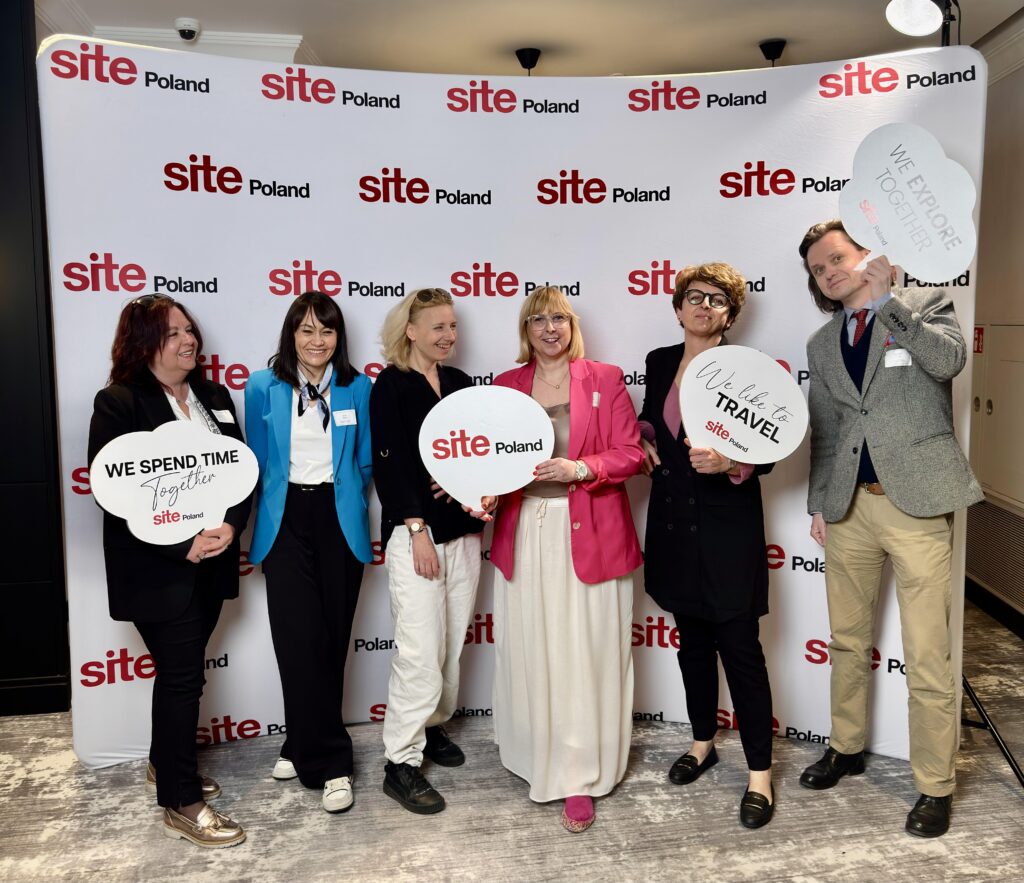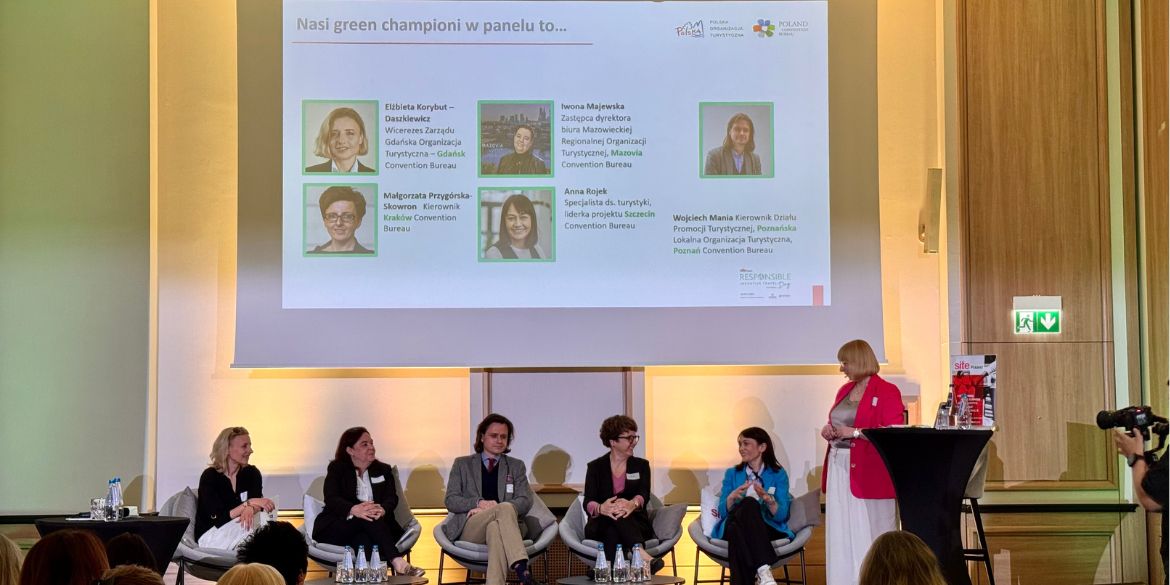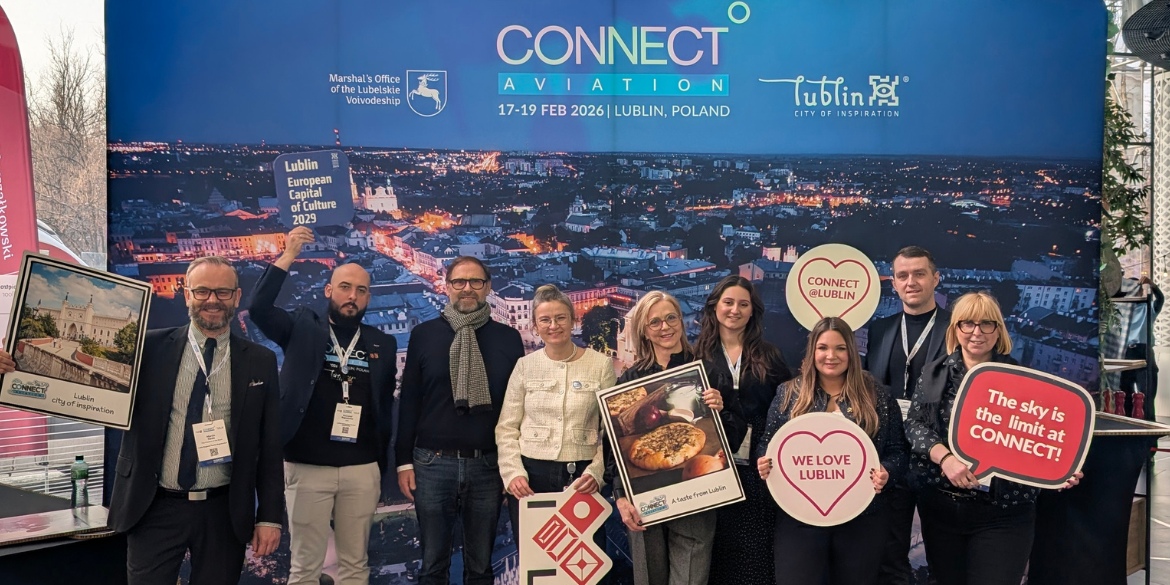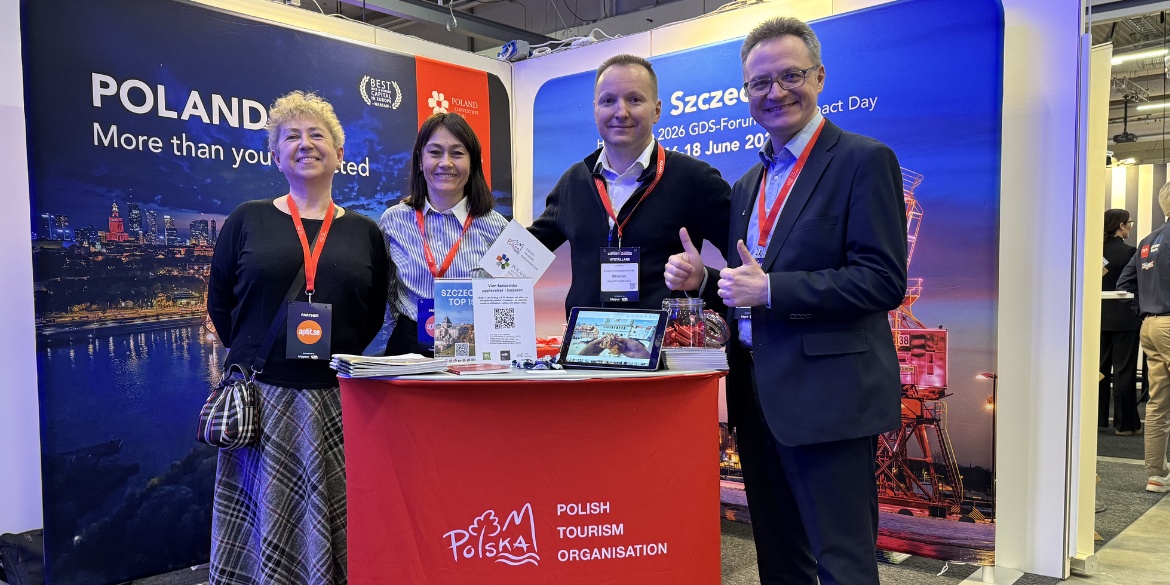During the third session of the Responsible Incentive Travel Day 2025 conference, held on 24 April in Warsaw, delegates participated in a panel discussion entitled “Poland – a Sustainable Offer of Polish Destinations”. The event brought together representatives of regional convention bureaux and institutions responsible for promoting sustainable development in the business tourism sector.
Opening
Aneta Książek, Head of the Poland Convention Bureau at the Polish Tourism Organisation, opened the panel. In the first part of the session, Książek presented the results of a trade fair audit conducted by POT, highlighting the growing importance of sustainability in the context of international trade fairs. Data collected over the past three years, particularly regarding Polish exhibitors’ participation at IMEX and IBTM events, was analysed.
Findings revealed that 47% of hosted buyers engaging with Polish exhibitors were actively interested in sustainable offers from Polish destinations, while an additional 27% changed their perception after being introduced to specific proposals.
The second part of the panel featured representatives from five Polish destinations, who presented their initiatives aimed at implementing sustainable development standards.
Gdańsk – A Pioneer of Conscious Destination Management
Elżbieta Korybut-Daszkiewicz, Vice President of the Gdańsk Tourism Organisation, underlined the transformation that the city underwent after joining the Global Destination Sustainability Index (GDS-Index). The establishment of the role of Green Champion within the Gdańsk Convention Bureau and the implementation of GDS-Index training courses reflect the city’s deep commitment to systemically introducing sustainability standards.
Over the past several years, Gdańsk has consistently strengthened its position as a consciously managed destination. A key turning point was its accession to the GDS-Index, which not only demands transparency but also stimulates continuous improvement in environmental, social, and economic practices.
As Korybut-Daszkiewicz highlighted, much has changed since the first audit:
- The “Green Champion” role was established within the Gdańsk Convention Bureau to coordinate and implement sustainable development policy.
- Numerous training sessions were conducted for local stakeholders, including the local industry’s preparation for the next GDS-Index edition.
- The city hosted the workshop “Regenerating Polish Destinations: Sustainable Tourism in Action.”
- Local partnerships with hotels, venues, and restaurants were developed, promoting environmental certifications such as Green Key.
- Gdańsk actively promotes low-emission mobility, supporting event attendees in choosing public or bicycle transportation.
Kraków – Certification as a Competitive Advantage
Małgorzata Przygórska-Skowron, Head of the Kraków Convention Bureau, pointed to the importance of sustainability certifications. Kraków was the first Polish city to join the GDS-Index and has since prioritised the measurability and transparency of its activities.
Przygórska-Skowron noted that the decision to join the GDS Movement was a response to rising international market expectations and the demands of congress organisers. Environmental certifications such as Green Key, ISO 20121, or EMAS are gaining tangible significance in event acquisition processes because:
- More and more institutional and association clients are asking for a specific list of certified venues.
- Systematic actions taken by the city allow for the creation of cohesive marketing narratives, for instance around environmental topics, UNESCO heritage, and social responsibility.
- The local DMO closely cooperates with the hotel and gastronomy sectors, offering eco-packages (e.g., plant-based meals, and plastic reduction initiatives).
Kraków views certification as a competitive edge that attracts conscious clients from across Europe. The GDS Index initiative is well recognised internationally, and simply joining it is seen as a sign that a city is actively working to improve the quality of its services and offers.
Within the GDS Index framework, the role of Destination Management Organisations (DMOs), tourism departments, and convention bureaux is crucial. While the implementation of sustainable practices may largely fall on other stakeholders, compiling accurate data on what the city is already doing in four key areas is a massive effort. Responses to the Index’s questions must be substantiated by reports and evidence – not mere declarations.
The role of the Green Champion (as in Gdańsk), or a similar sustainability specialist, involves both meticulously collecting data and educating the industry about the value of certification. Many entities (hotels, PCOs, DMCs) implement sustainable practices independently of the GDS Index, but certification remains crucial, especially as major hotel chains and corporations already adhere to such standards.
It is anticipated that shortly, sustainability requirements will become standard across supplier networks, making simple declarations insufficient. While Kraków already boasts 30 certified entities, the total number of tourism providers is much higher, signalling that the industry still has a long road ahead. Mass-market, low-cost tourism continues to dominate, but respect is increasingly afforded to those who build responsible offers and are not afraid to go against market expectations.
Przygórska-Skowron invited attendees to explore the “Sustainable Meetings” section on the Kraków Convention Bureau website, where interviews with local partners and businesses implementing sustainable practices are available.
Mazovia – a Return to Nature and Cultural Heritage
Iwona Majewska, Deputy Director of the Mazovian Regional Tourist Organisation – Mazovia Convention Bureau, emphasised the growing interest in events held in natural settings and locations tied to the region’s folk traditions. Sites such as Kampinos National Park and open-air museums are becoming attractive alternatives to conventional conference spaces. The region’s unique natural assets and cultural heritage align well with the global trend of returning to nature and authentic experiences.
Highlighted venues include:
- Kampinos National Park is ideal for eco-workshops and integration events.
- Mazovian Vineyards – increasingly used as event venues.
- The Mazowsze Ensemble Cultural Centre.
- Open-air museums, such as the Museum of the Radom Countryside and the Kurpie Homestead in Kadzidło, allow history, education, and integration to be combined.
Mazovia positions itself as the “Heart of Poland,” and its offer fits perfectly with the slow life trend. Research conducted in 2024 showed that outside Warsaw, the greatest tourist traffic occurred in Kampinos National Park (1.2 million visitors) and around Lake Zegrze (Legionowo County), as well as in various open-air museums.
Several years ago, the region launched a project titled “Mazovian Village Invites,” which explored the potential of rural tourism, understood more broadly than agritourism. The project identified facilities offering more than accommodation and meals. Although certifications were lacking, by the second year of the project, an analysis began to assess whether rural properties were implementing sustainable development principles.
It turned out that many owners were rigorously following sustainability principles in three areas:
- Environmental – permaculture gardens, plastic elimination, rainwater harvesting, natural building materials, and leaving meadows for wildlife.
- Social and economic – sourcing from local producers, shortening supply chains, collaborating with local communities, and involving folk artists in their offerings.
Many of these venues are suitable for incentive travel, small corporate meetings, conferences, or training sessions.
As part of the project, an online publication was created, interviews and promotional videos with owners were recorded, and a conference was organised.
Subsequent editions, such as “Mazovian Village Traditions,” aimed to identify artisans preserving disappearing trades and facilitate intergenerational exchange, e.g., by organising visits of vocational school students to traditional craftsmen. In later years, the project also included young people with intellectual disabilities from special educational centres. These experiences, particularly from the perspective of youth, revived faith in preservation for future generations. It was stressed that the “Mazovia trend” and “Slow Life fashion” resulted from these actions.

Poznań – The Sustainable Lifestyle of Its Residents
Wojciech Mania, Head of the Tourism Promotion Department at the Poznań Local Tourism Organisation – Poznań Convention Bureau, outlined a series of initiatives. Poznań is deeply associated with large-scale events, particularly those organised by the Poznań International Fair (MTP), which boasts over a century of history and is rooted in the city’s merchant traditions.
The fairs are a “lesson for the city” in terms of sustainable development. For example, after the 1929 General National Exhibition, some of the fairgrounds were repurposed as settlements for the unemployed, reflecting the social impact of events.
Today, the fairs are undergoing a process of reinvention due to the pandemic, digitalisation, and growing competition. Despite hosting over 300 events annually, attracting at least 1.3 million participants, the fairgrounds have long operated as a “city within a city”, functioning as a closed enclave. A noteworthy shift has been the effort to open these grounds to residents by offering public events (regional product fairs, markets, concerts) and making the space walkable.
This transformation is part of a broader movement toward sustainable urban and economic development, where tourism becomes a tool for inclusive growth, rather than just a consumer product.
Poznań’s sustainable initiatives include:
- Free public transport is available for participants of selected events.
- Opening up MTP areas to locals, fostering community integration and bridging the gap between business tourism and the resident population.
- Activating local partners, particularly in gastronomy and culture, including festivals, beer trails, regional cuisine food trucks, and joint initiatives with NGOs.
Sustainability is becoming increasingly important in bid processes, where proposed initiatives enrich the “city milieu” for event participants. One example is the free public transport programme as part of special event packages.
Although Poznań has not yet joined the GDS Index or undertaken destination certification, these actions are considered a step in that direction. The city also highlights its historic “green wedge” system, designed pre-WWII by urban planner Czarnecki and biologist Bodziczko, which utilises river valleys and fortifications to support urban biodiversity. This system continues to provide ecological corridors and ventilation for the city.
In the global context, data from an American tourism portal was cited, stating that 8% of global CO₂ emissions come from tourism. Concerns were also raised that, despite declarations (e.g., from Glasgow), these emissions may still increase by 2030. Although awareness is growing, Booking Holdings’ CEO acknowledged that price still drives most travel decisions.
Nevertheless, Poznań prioritises authenticity and inclusiveness, merging modernity with heritage to deliver positive participant experiences and reinforce the city’s image as a responsible, welcoming destination.
Mania concluded by referencing the Harpagen craft brewery, which, in collaboration with the University of Life Sciences, is developing low- and non-alcoholic beers made from plant waste. He also highlighted the Poznań Heritage Centre, operator of the Brama Poznania and the Enigma Cypher Centre, focusing on river-based events, eco-gardens, and heritage interpretation, offering intimate, meaningful event experiences.
Szczecin – The Green Vision of Floating Garden in Practice
Anna Rojek, Project Leader at the Szczecin Convention Bureau, presented the city’s development strategy. Since 2008, Szczecin has been implementing its “Floating Garden” vision, which is based on integrating urban development with nature in order to create an ecological metropolis that is both people- and environment-friendly. The city positions itself as a “green garden.”
Embarking on a path of sustainable development is a natural step for Szczecin, and its accession to the GDS Index in March 2025 represents a further formal declaration of its commitment in this area. The aim is to improve communication and build competitive strength in the international MICE market. This move sends a clear message to the global industry: the city is committed to responsible tourism.
Research conducted as part of the strategy for the Szczecin Convention Bureau has shown that Szczecin is a popular choice among domestic event organisers, particularly from Western and Central Poland, including major corporate clients and environmentally conscious associations. The city is currently developing its offer in the following key areas:
- Cooperation with environmentally conscious sectors, particularly from Western Poland, Germany, and Scandinavia.
- Nature-based events that make use of parks, water, and green urban spaces.
- Education of local partners to ensure alignment with the expectations of the international market.
The challenges identified include the need for further integration within the industry and the development of certification, alongside a recognition of the great potential inherent in Szczecin’s location and strong sense of place identity.
The Convention Bureau operates as part of the municipally owned company Żegluga Szczecińska Wydarzenia, which also offers a wide range of water-based attractions. In addition to joining the GDS Index, the city is adopting a new development strategy strongly aligned with the United Nations Sustainable Development Goals (SDGs), complemented by a dedicated programme for sustainable tourism and events.
Although industry-wide education remains necessary, Szczecin boasts an excellent portfolio of venues, including:
- The Mieczysław Karłowicz Philharmonic Hall,
- The Water Factory (Fabryka Wody),
- The Jerzy Stelmach Maritime Science Centre.
Panel Conclusions: Destinations
Sustainable development is no longer merely a trend — it has become a necessity, especially in the MICE sector, where social and environmental responsibility is increasingly a decisive factor in destination selection. The discussion highlighted key aspects of this growing trend, which not only responds to global challenges but also presents a significant opportunity to enhance the competitiveness of Polish cities. Destination representatives bear responsibility for shaping perceptions, setting directions, and promoting best practices in this area.
Key Takeaways:
Sustainability as a Priority
Joint efforts towards sustainable development are essential to attract international event organisers. According to a survey conducted by the Poland Convention Bureau (PCB), sustainability is becoming an increasingly important consideration for clients in their decision-making processes. However, the survey also reveals that only a portion of organisers treat it as a top priority. It is therefore crucial to provide appropriate education and communication on available eco-friendly options that can encourage more conscious choices.
Promotion of Certification and Best Practices
Certifications such as the GDS Index have become powerful tools for distinguishing cities and regions in the context of sustainable development. Gdańsk and Kraków, as Poland’s pioneers in this area, have demonstrated the strategic value of possessing international certifications. These not only raise prestige but also attract responsible event organisers. Through certifications such as Green Key, EcoLabel, or ISO 14001, cities can clearly demonstrate their commitment to environmental and social responsibility, which is a key component of their marketing strategies.
Raising Awareness and Education
One of the most important conclusions from today’s discussion is the need to educate both organisers and attendees. Presenting ecological practices — such as certified hotels, green transport solutions, sustainable gastronomy, or initiatives to reduce the carbon footprint — not only serves as a competitive advantage in acquiring events but also plays a role in raising awareness among key industry decision-makers.
Integration with Local Initiatives
A crucial element of promoting sustainable MICE tourism is collaboration with local stakeholders — from cultural institutions and regional vineyards to museums and local communities. In cities such as Poznań, Mazovia, and Szczecin, we are seeing increased cooperation with local festivals, cultural initiatives, and especially the gastronomic sector, which is increasingly focused on local produce and sustainable cuisine. Such collaborations enrich the MICE offering and attract organisers looking for authenticity and added value in the destinations where their events take place.
The Role of the Green Champion
Appointing specialists dedicated to sustainability within destination management organisations (DMOs) — as seen in Gdańsk — is a powerful example of a city’s commitment to promoting ecological standards. The Green Champion plays a vital role in the effective implementation of sustainability strategies at the destination level. Alongside certification, this initiative is a step toward a future where sustainable development becomes not just a trend, but the industry standard.
Sustainable development in the meetings and events industry is becoming a core foundation for destination competitiveness. Promoting eco-friendly solutions, advancing education, supporting local initiatives, and integrating environmental certifications are all critical elements for attracting responsible event organisers.
As an industry, we bear a great responsibility in driving this transformation, shaping sustainable paths forward and championing global best practices.
#PolandCVB #ResponsibleIncentiveTravelDay
Compiled by: Aneta Książek, Jarosław Marciuk
Wyświetl ten post na Instagramie




